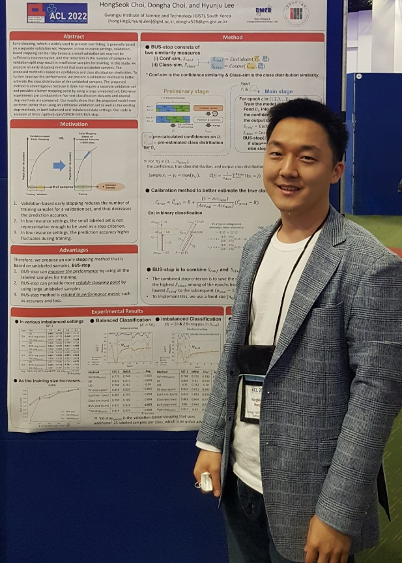News & Event
Alumni Interview
- HOME
- News & Event
- Alumni Interview
- Author
- 전기전자컴퓨터공학부
- Views
- 237
- Registraion Date
- 2025-08-28

“I Enjoy the Research Process Itself” — Interview with Alumnus Dr. Hongseok Choi
Graduated from Professor Hyunjoo Lee’s lab at Gwangju Institute of Science and Technology (GIST), currently working at ETRI (Electronics and Telecommunications Research Institute).
We conducted a 30-minute online interview with Dr. Hongseok Choi, who is devoted to developing AI for education based on natural language processing and artificial intelligence. He shared his joy in research, advice for graduate students, and future goals.
1. Self-Introduction and Research Field
Dr. Choi completed his Ph.D. at GIST in Professor Hyunjoo Lee’s lab. During his doctoral studies, he focused on natural language processing (NLP), particularly deep learning methodologies that achieve high performance with limited training data. His research aimed at finding effective model training methods in environments where data collection is challenging. He highlighted three particularly rewarding moments:
-
When his self-devised methodology yielded strong experimental results.
-
When his research papers were accepted.
-
When his work was cited by other researchers.
2. Why He Chose the Path of a Researcher
On why he chose to join ETRI, he explained: “The research resources and environment are stable, and there are many opportunities to collaborate with excellent researchers.” He also appreciated the ample infrastructure, such as GPU support, and said that the career paths of senior colleagues greatly influenced his decision.
His motivation for graduate school was somewhat special. In 2016, the AlphaGo vs. Lee Sedol match convinced him of AI’s potential. At the time, he was working on an image detection project for his undergraduate capstone, making the transition into AI a natural step. He chose GIST partly because the conditions aligned with his situation and because he preferred graduate schools under the Korea Advanced Institute of Science and Technology system.
3. Current Research and Goals
Currently, he is focusing on educational AI, especially developing conversational large language models (LLMs) specialized for foreign language education. Whereas he previously worked on task-specific customized models, he is now exploring how to apply more general-purpose models effectively in real educational contexts.
Although he has not set a fixed long-term goal, he hopes to “continue publishing steadily in good journals and top conferences and maintain his scholarly activities as he does now.”
4. Research Process and Stress Relief
While he enjoys research, he admitted that he feels stress when results don’t turn out well or when paper reviews are unfavorable. In such times, casual discussions with colleagues not only helped him find clues for problem-solving but also eased his mental burden.
5. Advice for Graduate Students
He emphasized: “Graduate school is perhaps the only time you can devote yourself purely to research. Make the most of it.” He advised students not to confine themselves only to their lab but to seek broader experiences through conferences, internships, and overseas events. Such experiences, he said, provide both motivation and insights that are invaluable later on.
Finally, he noted: “AI is already transforming society and will become an even more essential skill in the future.” He stressed the importance of national-level collaboration and preparation to become a global AI leader, underlining the need for organic cooperation across different sectors of society to keep pace with AI’s rapid development.
Closing
Dr. Choi’s research journey can be summed up in one word: “enjoyment.” His focus on finding joy in the process rather than succumbing to performance pressure, his choice of a stable yet challenging research environment, and his practical advice to younger scholars offer meaningful inspiration to many graduate students.

